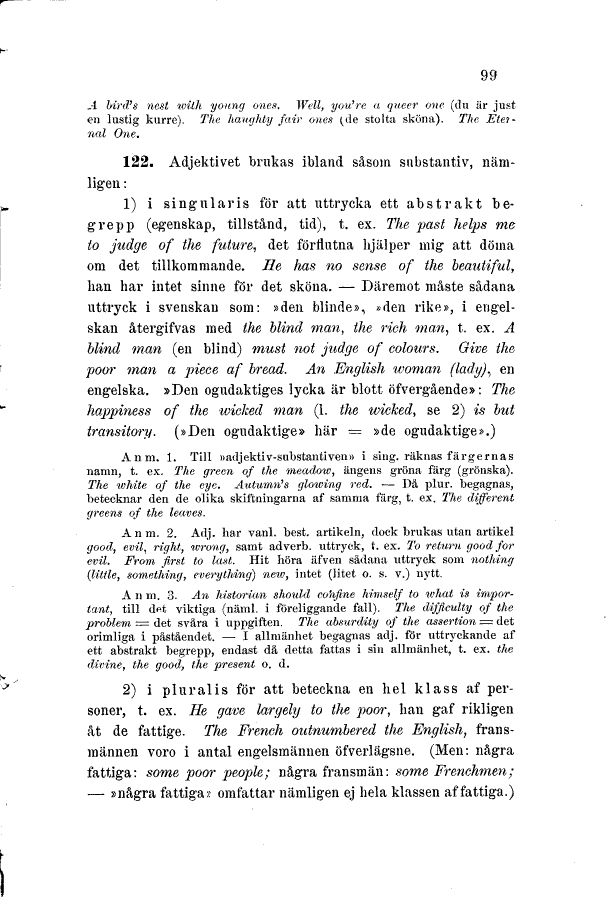
Full resolution (TIFF) - On this page / på denna sida - 3. Adjektiv.

<< prev. page << föreg. sida << >> nästa sida >> next page >>
Below is the raw OCR text
from the above scanned image.
Do you see an error? Proofread the page now!
Här nedan syns maskintolkade texten från faksimilbilden ovan.
Ser du något fel? Korrekturläs sidan nu!
This page has been proofread at least once.
(diff)
(history)
Denna sida har korrekturlästs minst en gång.
(skillnad)
(historik)
99
A bird’s nest with young ones. Well, you’re a queer one (du är just
en lustig kurre). The haughty fair ones (de stolta sköna). The
Eternal One.
122. Adjektivet brukas ibland såsom substantiv, nämligen:
1) i singularis för att uttrycka ett abstrakt begrepp
(egenskap, tillstånd, tid), t. ex. The past helps me
to judge of the future, det förflutna hjälper mig att döma
om det tillkommande. He has no sense of the beautiful,
han har intet sinne för det sköna. - Däremot måste sådana
uttryck i svenskan som: »den blinde», »den rike», i engelskan
återgifvas med the blind man, the rich man, t. ex. A
blind man (en blind) must not judge of colours. Give the
poor man a piece af bread. An English woman (lady), en
engelska. »Den ogudaktiges lycka är blott öfvergående»: The
happiness of the wicked man (l. the wicked, se 2) is but
transitory. (»Den ogudaktige» här = »de ogudaktige».)
Anm. 1. Till »adjektiv-substantiven» i sing. räknas färgernas
namn, t. ex. The green of the meadow, ängens gröna färg (grönska).
The white of the eye. Autumn’s glowing red. - Då plur. begagnas,
betecknar den de olika skiftningarna af samma färg, t. ex. The
different greens of the leaves.
Anm. 2. Adj. har vanl. best. artikeln, dock brukas utan artikel
good, evil, right, wrong, samt adverb. uttryck, t. ex. To return
good for evil. From first to last. Hit höra äfven sådana uttryck
som nothing (little, something, everything) new, intet (litet
o. s. v.) nytt.
Anm. 3. An historian should confine himself to what is important,
till det viktiga (näml. i föreliggande fall). The difficulty of the
problem = det svåra i uppgiften. The absurdity of the assertion = det
orimliga i påståendet. - I allmänhet begagnas adj. för uttryckande af
ett abstrakt begrepp, endast då detta fattas i sin allmänhet, t. ex. the
divine, the good, the present o. d.
2) i pluralis för att beteckna en hel klass af personer,
t. ex. He gave largely to the poor, han gaf rikligen
åt de fattige. The French outnumbered the English, fransmännen
voro i antal engelsmännen öfverlägsne. (Men: några
fattiga: some poor people; några fransmän: some Frenchmen;
- »några fattiga» omfattar nämligen ej hela klassen af fattiga.)
<< prev. page << föreg. sida << >> nästa sida >> next page >>